Second inauguration of Nicolás Maduro
The second inauguration of Nicolás Maduro as President of Venezuela took place on Thursday, 10 January 2019. The inauguration involved the swearing-in of Nicolás Maduro for his second term, and, especially within the context of Maduro's election, has been controversial and contested by various figures and organizations.
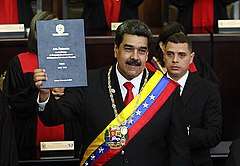 Nicolás Maduro shortly after his swearing-in | |
| Date | 10 January 2019 |
|---|---|
| Time | 3:00pm VST (UTC-4) |
| Venue | Supreme Tribunal of Justice of Venezuela |
| Location | Caracas, Venezuela |
| Also known as | 2019 Presidential inauguration of Nicolás Maduro |
| Participants | Nicolás Maduro |
Election
On 20 May 2018,[1] elections were held across Venezuela to elect the President to take office in January 2019. These elections were initially scheduled for December 2018, but were rescheduled twice by Maduro—the incumbent—in a move seen as limiting the ability of other candidates to run.[2][3][4][5] The Constituent Assembly announced the election, although it did not have the power to do so constitutionally.[6] Several of the main opposition candidates, such as Henrique Capriles, Leopoldo López and Antonio Ledezma, were disqualified from running.[7][8]
The official turnout reported by the National Electoral Council was 46.07%.[9] The Democratic Unity Roundtable estimated the turnout at 25.8%, based on its quick count estimates.[10] Maduro dismissed allegations of foul play, and stated that "the opposition must leave us alone to govern".[11]
The contention around the legitimacy of the inauguration was primarily based on the unusual activity of the election. Several Venezuelan NGOs, such as Foro Penal Venezolano, Súmate, Voto Joven, the Venezuelan Electoral Observatory and the Citizen Electoral Network, expressed their concern and cited the lack of the Constituent Assembly's competencies to summon the elections, impeding participation of opposition political parties, and the lack of time for standard electoral functions,[6] and many countries worldwide, such as the European Union, Latin American governments and the United States, declared that the election was illegitimate.[12]
Inauguration
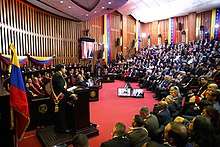
Maduro's inauguration took place on 10 January 2019 in the Supreme Court building in Caracas.[13]
The Venezuelan constitution specifies that inaugurations should be conducted by the National Assembly, at the Federal Legislative Palace.[14] The Maduro administration views the National Assembly as being "in contempt", so his inauguration was officiated by the Supreme Court instead.[11][15] Maduro was sworn in by Maikel Moreno, President of the Supreme Court, at 3:00pm;[16] he ignored calls from the Lima Group to hand over power to the National Assembly until another election could be held.[13]
Before the stage, a large military parade—which had moved through Caracas—took place on Avenida Bolívar,[17] and the military gave its inaugural pledge of undying loyalty to Maduro for his six-year term.[18] At the start of the inauguration, Maikel Moreno went blank and stuttered, having forgotten what to say, before looking to the side and continuing.[19] Maduro gave an 80-minute address to those gathered, in which he stated: "We are a true, profound, popular and revolutionary democracy [...] I, Nicolás Maduro Moros, am a genuinely and profoundly democratic president." He also directly threatened Colombia, the United States, and Europe, telling the latter to "respect Venezuela […] or sooner rather than later you’ll pay the historical price".[12] He also criticized his own party and political affiliation, saying that his plan for his second term was to "correct the mistakes of the Bolivarian Revolution", and that "corrupt chavistas" are actually his greatest threat.[12]
Maduro said that 94 countries were present at his inauguration,[16][20] but this count included the members of international organizations like the African Union and the Arab League. The number of UN-recognized countries who sent representatives to the inauguration act was 17: Bolivia, Cuba, Nicaragua, El Salvador and South Ossetia sent their presidents; Turkey and Suriname sent their vice presidents; Belarus, Saint Kitts and Nevis and Saint Vincent and the Grenadines sent their prime ministers; and Antigua and Barbuda, China, Dominica, Granada, Iran, Mexico and Saharawi sent diplomatic representatives. Palestine and South Ossetia, which are not officially-recognized members of the UN, also sent representatives.[21][22]
Support
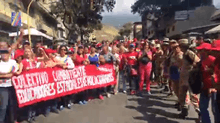

The "small" crowd gathered for the inauguration showed "little support"; this has been compared to the large crowds present at Maduro's first inauguration.[13] Ricardo Sánchez, a member of the Constituent Assembly, said that there was obvious national support for Maduro at the inauguration, and that "[the government is] convinced that the majority of the people who voted for the president in May are united today with loyalty and discipline to be with Nicolás Maduro for another six years".[13] It has also been reported that some people present at the inauguration were forced to appear, including all those who work for the government; one woman told The Guardian that she had been forced to attend. She also said that despite working in a government Ministry, she isn't paid enough to feed her family, and is planning to leave the country as soon as possible. Others at the inauguration were present because they believe in Maduro; one laborer said he can "identify with Maduro because he's a humble man" and shares his ideology.[12]
In addition, Turkish President Recep Tayyip Erdoğan voiced solidarity with Maduro,[23] and Cuban President Miguel Díaz-Canel, Bolivian President Evo Morales, President Daniel Ortega of Nicaragua, President Salvador Sánchez Cerén of El Salvador, Prime Minister of Saint Vincent and the Grenadines Ralph Gonsalves, Prime Minister of Saint Kitts and Nevis Timothy Harris and Vice President of Suriname Ashwin Adhin attended Maduro's swearing-in ceremony among representatives of other countries.[24]
Criticism
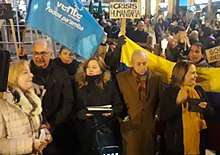
Protests were reported in several Venezuelan states, including Lara, Zulia, Trujillo, and in the capital city Caracas.[25] Several cacerolazos were reported in many areas of Caracas, including near the Supreme Tribunal, where Maduro was sworn in.[26][27]
Large protests also took place in Miami, United States, an area with a large Venezuelan migrant population,[28] as well as a dozen other nations worldwide, including multiple protests across Spain and its islands.[29] Protests also took place in cities such as Barcelona, Bogotá, Buenos Aires, Lima, London, Madrid, Ottawa, Paris and Quito.[30][31]
Response
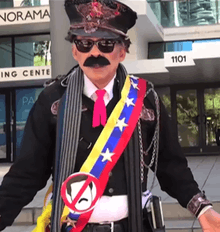
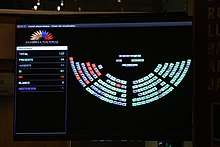
Many nations and supranational bodies did not recognize Maduro as a legitimate President, including the Lima Group and the Organization of American States. John R. Bolton, U.S. National Security Advisor, said, "The US will not recognize the Maduro dictatorship's illegitimate inauguration." In response, Maduro said during his inauguration that the United States and Lima Group's lack of recognition was turning his ceremony into "a world war".[12][32] On 11 January, Russia accused the US of attacking Venezuela's freedom.[33]
In response to Maduro's inauguration, Argentine President Mauricio Macri stated "Venezuela is living under a dictatorship".[12] South African President Cyril Ramaphosa congratulated Maduro following his inauguration.[34]
On 11 January, Venezuelan ministers claimed there were violent attacks on the Venezuela Embassy in Lima, Peru.[35] Peru and Paraguay closed their embassies in Venezuela and recalled diplomats,[32] and Paraguay also removed Venezuelan diplomats from its own country.[36] Peru also barred Maduro and 100 other Venezuelan politicians from entering the country,[32] and Argentina similarly banned the entry of Venezuelan government personnel.[13] As a collective, the Lima Group announced that if Maduro took office they would ban travel to their nations and stop military cooperation, supposedly tactics designed to turn the Venezuelan military against their leader. Mexico abstained from the group announcement, with new president Andrés Manuel López Obrador citing the non-intervention policies of his government.[37] In response to the group's announcement, Maduro threatened them with "diplomatic measures" if they didn't revoke the resolution.[38] David Smilde from the Washington Office on Latin America had said despite preemptive threats from the Lima Group, he didn't expect any of the member countries to actually remove embassies. Instead, he thought that they would simply tell Maduro that he is illegitimate and that they would be ignored. However, the Lima Group did follow through with their threats, and Smilde suggested that this action would make Maduro and his allies "fret".[37] In a foreign ministry statement, Brazil called on "all of the world's countries" to "stop supporting [Maduro] and come together to liberate Venezuela".[39]
On 7 January 2019, several days before the inauguration, Supreme Court Justice and member of the Electoral Commission Christian Zerpa, who had previously been aligned with Maduro, defected to the United States, calling Maduro "incompetent" and the elections "unfair".[13] In response, the government said that Zerpa had fled the country in order to escape charges of sexual harassment.[40] US intelligence also suggested that there was more fracturing within Maduro's close ranks, and that his general Vladimir Padrino López had threatened to resign if Maduro took office.[41]
Though many called for power in Venezuela to be deferred to the National Assembly, Phil Gunson of the Caracas Crisis Group said that the opposition, which has the Assembly's majority, was not united well enough to bring the failing state into prosperity.[12][42]
Economically, Maduro's continued rule has led experts to estimate that Venezuela would experience at least 23 million percent inflation by the end of 2019.[36]
National Assembly responses
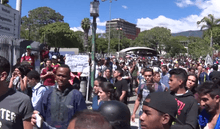
Juan Guaidó, the President of the National Assembly of Venezuela, gave a speech in the Assembly after Maduro's inauguration. In no uncertain terms it called for a reclamation of power, and declared that Venezuela was technically without a leader, stating that "today there is no head of state. Today there is no commander-in-chief".[36] Beforehand, the opposition had called on the people to protest during the inauguration, and they boycotted it.[11] Students took part in one protest led by Rafaela Requesens and Guaidó's Popular Will party, blocking off a road and again calling Maduro a "usurper".[43]
In an official statement on the day of Maduro's inauguration, Guaidó announced a state of emergency,[44][45][46] emphasizing the need to recover control by uniting the people, foreign allies, and the military. He expressed anger that Maduro continues to "dismantle" the rule of law and that Venezuela has ended up with a de facto government. In response to Maduro's "usurpation" he then proposed on behalf of the government "to declare the usurpation of the office of the President", saying "we call on those soldiers who wear their uniforms with honor to step forward and enforce the Constitution [...] we ask citizens for confidence, strength and to accompany us on this path."[47] He also said that Maduro's inauguration was a "coronation of paper", and defied the idea that Maduro could fully disband the National Assembly, which he said he would.[47]
From its opening on 5 January, the National Assembly has been formulating plans to implement a transitional government, before taking back control.[48] On 11 January, Guaidó summoned an open cabildo (Spanish: Cabildo abierto);[45] the term roughly translates as a "town hall meeting", but cabildos abiertos were historically convened for more emergent or disastrous matters.[49] At the open cabildo, the National Assembly announced Guaidó's assumption of presidential powers and duties.[50]
References
- Martinez, Ana Isabel (1 March 2018). "Venezuela postpones presidential election to May 20". Reuters. Retrieved 1 March 2018.
- "Venezuela opposition weighs election run". BBC News. 8 February 2018. Retrieved 8 February 2018.
- Redacción, Voz de América - (1 March 2018). "Postergan elecciones en Venezuela hasta mayo". Voice of America (in Spanish). Retrieved 1 March 2018.
- Sen, Ashish Kumar (18 May 2018). "Venezuela's Sham Election". Atlantic Council. Retrieved 20 May 2018.
Nicolás Maduro is expected to be re-elected president of Venezuela on May 20 in an election that most experts agree is a sham
- "Venezuela's sham presidential election". Financial Times. 16 May 2018. Retrieved 20 May 2018.
The vote, of course, is a sham. Support is bought via ration cards issued to state workers with the implicit threat that both job and card are at risk if they vote against the government. Meanwhile, the country’s highest profile opposition leaders are barred from running, in exile, or under arrest.
- • Rodríguez Rosas, Ronny (23 February 2018). "Foro Penal no avala convocatoria a elecciones presidenciales". Efecto Cocuyo. Archived from the original on 29 June 2019. Retrieved 29 October 2019.
- León, Ibis (9 December 2017). "Observadores electorales detectan 11 irregularidades en el proceso de municipales". Efecto Cocuyo. Archived from the original on 9 June 2019. Retrieved 29 October 2019.
- Rodríguez Rosas, Ronny (15 February 2018). "CNE obstaculiza inscripción de venezolanos en Registro Electoral, afirman ONG". Efecto Cocuyo. Archived from the original on 9 June 2019. Retrieved 29 October 2019.
- León, Rafael (25 January 2018). "Adelanto de sufragios acorta plazos de jornadas del RE". El Nacional. Retrieved 9 February 2018.
- "Líderes opositores que no podrán ser candidatos en próxima elección presidencial de Venezuela". La Patilla (in Spanish). 23 January 2018. Retrieved 24 January 2018.
- Kraul, Chris; Mogollon, Mery (16 April 2017). "Meet the charismatic opposition leader the Venezuela government just can't silence". Los Angeles Times. Archived from the original on 17 April 2017.
- "Divulgación Electoral 2018". www.cne.gov.ve. Retrieved 21 May 2018.
- "Venezuela's Maduro on course for re-election amid low turnout". The Independent. 21 May 2018.
The Democratic Unity coalition, which was boycotting the vote, estimated turnout at 25.8 per cent by 1 pm based on its own quick count estimates.
- "Venezuela's Maduro begins second term". BBC News. 2019-01-10. Retrieved 2019-01-11.
- Phillips, Tom (2019-01-10). "Maduro starts new Venezuela term by accusing US of imperialist 'world war'". The Guardian. ISSN 0261-3077. Retrieved 2019-01-11.
- "Venezuela Is in Crisis. So How Did Maduro Secure a Second Term?". The New York Times. Retrieved 10 January 2019.
- "Parallel government emerging in Venezuela". Argus Media. Retrieved 12 January 2019.
- "Cabello: Maduro será reconocido por la ANC con carácter plenipotenciario" (in Spanish). El Nacional. 7 January 2019. Retrieved 4 November 2019.
- Pineda Sleinan, Julett (10 January 2019). "Investidura, apoyo militar y repudio internacional, todo lo que debe saber de este #10E" (in Spanish). Efecto Cocuyo. Archived from the original on 14 April 2019. Retrieved 29 October 2019.
- Olmo (@BBCgolmo), Guillermo D. (2019-01-10). "Por qué es polémico que Maduro jure como presidente de Venezuela y por qué lo hace ahora si las elecciones fueron en mayo". BBC News Mundo. Retrieved 2019-01-10.
- Fox, Jackie (2019-01-10). "Venezuela faces uncertain future as Maduro re-elected". RTÉ.ie.
- Tavel, Jimena (10 January 2019). "Eh, eh, el... presidente del Supremo se queda en blanco durante investidura de Maduro". El Nuevo Herald (in Spanish). Retrieved 11 May 2019.
- "Nicolas Maduro sworn in for second term as Venezuelan President amid worldwide calls for him to go". ITV News. Retrieved 11 January 2019.
- Avandaño, Shari. "Solo 17 países enviaron representación a la juramentación de Nicolás Maduro este #10E" (in Spanish). Efecto Cocuyo. Archived from the original on 2 February 2019. Retrieved 29 October 2019.
- "As Maduro Makes Enemies, Venezuela's Caribbean Allies Remain In His Camp". NPR. Retrieved 24 January 2019.
- "Turkey will attend the inauguration of President Maduro". Ministerio del Poder Popular para Relaciones Exteriores. 7 January 2019.
- "Presidentes y delegaciones en la asunción de Maduro". América XXI (in Spanish). 10 January 2019. Retrieved 6 October 2019.
- Ariza, Alma (10 January 2019). "VIDEO | Venezolanos repudiaron la juramentación de Nicolás Maduro" (in Spanish). Retrieved 13 January 2019.
- "acerolas sonaron en las inmediaciones del TSJ tras juramentación de Maduro [+Video]" (in Spanish). Versión Final. 10 January 2019. Retrieved 13 January 2019.
- "Reportan cacerolazos en Caracas mientras Nicolás Maduro es juramentado" (in Spanish). Informe21. 10 January 2019. Retrieved 13 January 2019.
- "Venezolanos en Miami protestaron contra Maduro". VOA. Retrieved 2019-01-11.
- "Migrantes venezolanos rechazaron la juramentación de Maduro en una docena de países - Efecto Cocuyo". efectococuyo.com. Retrieved 2019-01-11.
- Osorio, Sonia (9 January 2019). "Venezolanos en Miami participan en protesta mundial contra nuevo mandato de Maduro" (in Spanish). El Nuevo Herald. Retrieved 13 January 2019.
- "Venezuela's Maduro starts new term amid increasing isolation". Havana Times. Retrieved 13 January 2019.
- "Peru, Paraguay recall diplomats over Maduro inauguration | Venezuela News | Al Jazeera". www.aljazeera.com. Retrieved 2019-01-10.
- "Acusa Rusia a EEUU. de atentar contra la soberanía de Venezuela". Radio Rebelde. Retrieved 11 January 2019.
- "South Africa congratulates Maduro on second term". African Daily Voice. 11 January 2019.
- Sputnik. "Venezuelan Embassy Attacked in Peru - Venezuelan Foreign Minister". sputniknews.com. Retrieved 2019-01-11.
- Smith, Scott (2019-01-10). "Isolation greets Maduro's new term as Venezuela's president". AP NEWS. Retrieved 2019-01-11.
- correspondent, Tom Phillips Latin America (2019-01-09). "Venezuela's neighbours turn up heat as Nicolás Maduro begins second term". The Guardian. ISSN 0261-3077. Retrieved 2019-01-10.
- "Paraguay breaks diplomatic ties with Venezuela, neighbors join in condemning Maduro". RT International. Retrieved 2019-01-11.
- Tharoor, Ishaan (11 January 2019). "The looming showdown between Maduro and Bolsonaro". The Washington Post. Retrieved 11 January 2019.
- "Top Venezuela judge defects to US". BBC News. 2019-01-07. Retrieved 2019-01-10.
- Gibbs, Stephen (2019-01-11). "World leaders shun Venezuela as 'dictator' Maduro sworn in". The Times. ISSN 0140-0460. Retrieved 2019-01-11.
- "Alemania apoya para que asuma poder". El Nacional. Retrieved 2019-01-10.
- "Movimiento estudiantil protestó contra la juramentación de Maduro". El Nacional (in Spanish). Retrieved 10 January 2019.
- "AN se declara en emergencia ante la usurpación de Nicolás Maduro en el cargo de la Presidencia de la República" [AN declares itself in emergency over the usurpation of Nicolás Maduro in the office of the Presidency of the Republic] (in Spanish). National Assembly of Venezuela. Retrieved 10 January 2019.
La Asamblea Nacional de Venezuela se declaró en emergencia ante la usurpación de Nicolás Maduro en el cargo de la Presidencia de la República, así lo anunció el presidente del Parlamento venezolano, diputado Juan Guaidó ["The Venezuelan National Assembly has declared that it's in a State of emergency with the usurpation of the job of President of the Republic by Nicolás Maduro, as announced by the President of the Venezuelan Parliament, Deputy Juan Guaidó"]
- C.A, GLOBAL HOST. "El Tiempo | Venezuela | Asamblea Nacional se declaró en emergencia y convocó a cabildo abierto | El Periódico del Pueblo Oriental" (in Spanish). Retrieved 2019-01-11.
- "El Parlamento venezolano se declara "en emergencia" para protestar por la jura de Maduro". El Español (in Spanish). 2019-01-11. Retrieved 2019-01-11.
- "AN se declara en emergencia ante la usurpación de Nicolás Maduro en el cargo de la Presidencia de la República". www.asambleanacional.gob.ve. Retrieved 2019-01-11.
- "Asamblea Nacional arranca proceso para Ley de Transición". www.asambleanacional.gob.ve. Retrieved 2019-01-11.
- "Cabildo | local government". Encyclopedia Britannica. Retrieved 2018-12-06.
- "Juan Guaidó: Me apego a los artículos 333, 350 y 233 para lograr el cese de la usurpación y convocar elecciones libres con la unión del pueblo, FAN y comunidad internacional". www.asambleanacional.gob.ve. Retrieved 2019-01-11.